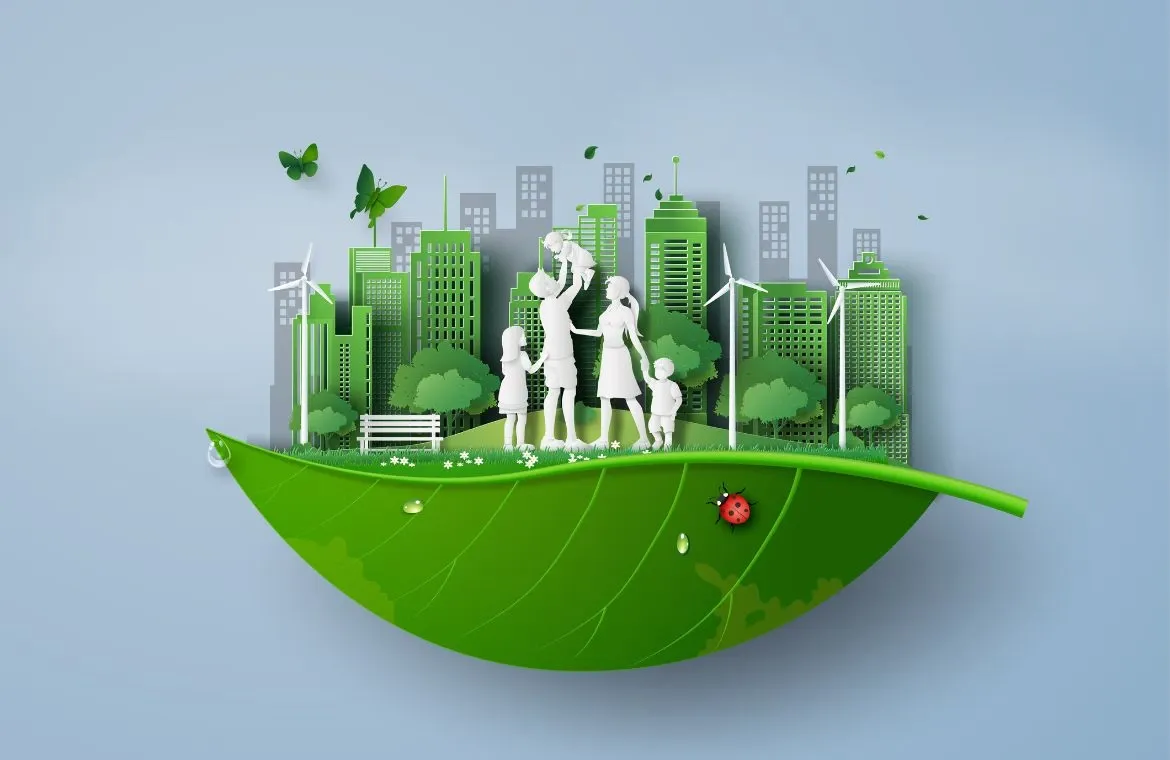Sustainability Engineering: Your Complete Beginner's Guide

Sustainable engineering means "the process of using resources in a way that does not compromise the environment or deplete the materials for future generations". Engineers combine environmental, social, and economic factors when they design, construct, and maintain projects.
A fundamental change has emerged in how we design, build, and maintain our world through sustainability engineering. Traditional engineering focused mainly on technical and economic aspects. Now, we take a more complete view of development challenges.
This blog will guide you through everything in sustainability engineering, from simple concepts to practical applications.
What is Sustainability Engineering?
Sustainability engineering is an approach to engineering that focuses on creating solutions that are environmentally responsible, economically viable, and socially beneficial. It involves designing and implementing systems, products, and processes that utilize resources efficiently, minimize waste and pollution, and promote long-term ecological balance.
Sustainability engineering's core focuses on creating systems that deliver essential functions while minimising environmental damage. This applies to buildings, infrastructure, product design, and manufacturing processes.
Engineers used to treat sustainability as an afterthought. For instance, they managed hazardous manufacturing substances as waste streams that required containment and treatment. This approach proved to be costly and detrimental to the environment. Modern sustainability engineering requires a comprehensive life cycle approach instead.
Sustainability engineering aims to:
- Reduce waste and manage materials
- Prevent pollution and improve products
- Conserve resources and adopt renewable energy
- Create resilient, lasting systems
How does it integrate Environmental, Social, and Economic goals?
Three connected pillars support sustainability engineering: environmental protection, social equity, and economic viability. People often refer to this framework as the ESG (Environmental, Social, Governance) approach.
Environmental aspects focus on minimizing ecological damage through reduced emissions and improved resource utilization. Engineers are now developing innovative materials and processes to mitigate these effects.
Social elements target human wellbeing and community strength. Access to clean water, energy, and public health improvements matters greatly. Engineers must understand the community impact of their projects and work to improve the lives of everyone.
Economic aspects balance growth with resource efficiency and financial stability. In stark contrast, sustainable methods often save money through reduced resource use, lower waste costs, and improved operations.
Combining these three areas needs a life cycle assessment (LCA). Engineers can identify opportunities for improvement at each stage through this comprehensive approach.
Real-world examples of sustainable engineering
Sustainability engineering principles are changing the way we build solutions for environmental challenges worldwide. Real-world examples demonstrate how these principles yield practical solutions across various sectors.
Green buildings and infrastructure
Green buildings are the lifeblood of sustainable engineering practice. These structures help save energy, water, and other resources while producing less pollution.
The Indian Green Building Council (IGBC) leads green building initiatives in India. These buildings use rainwater harvesting, solar panels, and natural ventilation. This design reduces the need for air conditioning, which is particularly beneficial in India's tropical climate.
Renewable energy systems
Renewable energy systems replace conventional sources, such as nuclear fuels, coal, and petroleum. These systems never run out and create minimal waste or pollution. Solar panels, wind turbines, and geothermal power are economical solutions that replace traditional fossil fuels.
India ranks fourth globally in renewable energy capacity and continues to grow stronger.
Sustainable agriculture and water systems
Agriculture uses more water than any other industry and needs smart water management. Precision irrigation enables farmers to provide crops with the exact amount of water at the optimal time and location. Drip irrigation sends water and nutrients straight to plant roots. This method produces better yields while using less water, fertiliser, and energy.
Smart cities and transportation
Smart cities integrate technology, foster collaboration between sectors, and embrace innovative ideas for sustainable urban development. Smart mobility makes city transport better and greener through:
- Electrification and automation of vehicular transport.
- Increased shared mobility and micro-mobility options.
- Mobility As A Service (MaaS) integration.
- Promotion of active travel and walkability.
India's Smart Cities Mission aims to improve transportation nationwide. This helps optimise vehicle movement and reduce traffic jams.
Key benefits of sustainable engineering
Sustainable engineering benefits go way beyond just protecting the environment. This field continues to evolve, demonstrating clear advantages across environmental, social, and economic areas.
Reducing carbon footprint
Engineers who focus on sustainability create systems that waste less through smart design and operation. They follow the principles of reduce, reuse, and recycle. This approach cuts down waste in landfills and lowers harmful emissions.
Improving community well-being
Sustainable engineering projects improve the quality of life for communities. They provide clean water, efficient transportation, and essential services. These projects create healthier spaces and boost public health.
Many Indian cities struggle with water shortages, but they have started implementing more effective water management methods.
Cost savings and efficiency
Many people might be surprised to learn that sustainable engineering often saves money. People often think that sustainability costs too much, but they overlook the long-term benefits of using resources wisely.
Projects focused on sustainability cost less to run over time. Energy-efficient buildings need less power and have lower maintenance costs. These projects save money because they use resources well and last longer.
Companies that prioritise sustainability can tap into more funding options, grants, and government incentives. The Indian government continues to tighten environmental regulations. Companies with good sustainable practices will avoid penalties and benefit from future incentives.
Skills and qualifications needed
A career in sustainability engineering needs a unique mix of education, technical knowledge, and people skills. Professionals must be well-versed in multiple areas because of the field's cross-disciplinary nature.
Educational background
You need to gain knowledge and understanding of sustainability engineering, and for that, you need to be open to learning, whether through short certifications or full-time courses, as per your availability. This will help you establish a strong theoretical foundation for tackling complex sustainability challenges.
Essential Soft and Hard skills
The best sustainability engineers combine technical expertise with strong people skills. They must know engineering principles, life cycle assessment techniques, and sustainability frameworks. Proficiency in design software, including AutoCAD, MATLAB, and Geographic Information Systems (GIS), plays a crucial role.
Key soft skills that make a difference include:
- Problem-solving abilities: Finding environmental issues and creating innovative solutions
- Project management: Leading and tracking sustainability initiatives
- Communication skills: Explaining complex technical ideas to non-technical people
- Systems thinking: Seeing connections in complex systems
- Critical thinking: Breaking down problems logically
Career paths in sustainability engineering
Green engineering careers are growing at a faster rate, creating numerous opportunities for professionals who want to make a meaningful impact on the environment. Currently, companies are in need of more sustainability professionals than are available, with a gap between supply and demand.
Also read: The Growing Demand for Sustainability Professionals in 2025
Emerging job roles
Chief Sustainability Officers
- Lead company-wide sustainability initiatives
- Align environmental goals with business strategy
Sustainability Consultants
- Advise businesses on adopting green practices
- Help reduce environmental footprints and improve efficiency
Carbon Accountants
- Track and report greenhouse gas emissions
- Ensure compliance with climate regulations and standards
Urban Sustainability Planners
- Design greener, more sustainable urban spaces
- Address pollution, transportation, and resource depletion
Circular Economy Specialists
- Focus on reducing waste through product redesign
- Promote closed-loop systems and sustainable resource use
Industries hiring sustainability engineers
High Demand Across Industries: Companies of all sizes in India are hiring sustainability professionals.
Renewable Energy Sector: Solar and wind power are among the fastest-growing industries and Job creation is happening four times faster than the overall market.
Green Building & Infrastructure: Demand for experts in energy-efficient design and sustainable materials.
Electric Vehicle (EV) Industry: Sustainability engineers are needed to support the shift to EVs.
Other Growing Sectors: Waste management, Sustainable textiles and Sustainable agriculture.
Conclusion
“Sustainability engineering is the engineering for the future without snatching away the earth from the coming or existing generations.”
Sustainability engineering stands at the vanguard of addressing our planet's most pressing environmental challenges and creates meaningful economic opportunities. Sustainability engineering provides clear benefits across multiple dimensions. Projects can significantly reduce carbon emissions. This becomes crucial in India, where the construction sector contributes heavily to national emissions.
So,To truly contribute to this transformative field, a solid foundation is key. Professionals looking to advance their careers in this field need a perfect blend of technical expertise with soft skills.
That’s where Sustainability Courses come in as they offer the knowledge, tools, and real-world perspectives needed to understand the science, policy, and engineering that drive sustainable change.
But, Without any doubt, sustainability engineering means more than a career path, it represents a steadfast dedication to creating resilient, equitable systems that benefit both present and future generations.
Frequently Asked Questions
Q1. What is sustainability engineering?
Sustainability engineering is an approach that integrates environmental, social, and economic considerations into the design and operation of systems, ensuring a holistic perspective. Sustainability engineering takes a holistic view to create solutions that are environmentally friendly, socially responsible, and economically viable.
Q2. What does a sustainability engineer do?
A sustainability engineer designs eco-friendly systems, reduces environmental impact, improves energy efficiency, and ensures sustainable practices in construction, manufacturing, and urban planning to build a greener, more resilient future.
Q3. Why is sustainable engineering important?
Sustainable engineering is vital because it ensures development without depleting natural resources or harming the environment. It balances innovation with responsibility, helping industries reduce waste, lower emissions, and build a resilient future for people and the planet.

TalentSprint
TalentSprint is a leading deep-tech education company. It partners with esteemed academic institutions and global corporations to offer advanced learning programs in deep-tech, management, and emerging technologies. Known for its high-impact programs co-created with think tanks and experts, TalentSprint blends academic expertise with practical industry experience.



